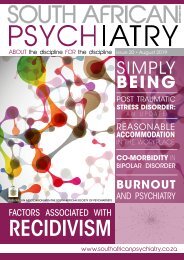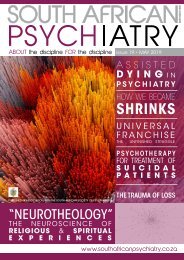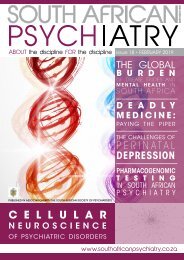South African Psychiatry - November 2020
South African Psychiatry - November 2020
South African Psychiatry - November 2020
You also want an ePaper? Increase the reach of your titles
YUMPU automatically turns print PDFs into web optimized ePapers that Google loves.
ADHD CONGRESS
1 ST SOUTHERN AFRICAN MULTIDISCIPLINARY ADHD CONGRESS
patients who have a diagnosis of ADHD, their prefrontal
cortex has a relative deficiency of dopamine
and noradrenaline and therefore side-effects are
milder than in patients who do not have ADHD and
use methylphenidate.
Atomoxetine is a non-stimulant pharmacological
treatment available in South Africa, this targets
noradrenaline reuptake inhibition, not dopamine.
It is considered a first line treatment for ADHD with
comorbid anxiety. It provides 24-hour cover of
ADHD and may be a useful medication for adults
who require cover into the evenings. Atomoxetine
requires somewhere in the region of 3 to 6 months of
treatment before full efficacy is realized so patients
need to be prepared for this.
Noradrenergic agonists, Tricyclic antidepressants,
mood stabilisers and SSRIs are not registered for
treating the core symptoms of ADHD in adults.
BUPROPION IS THE ONLY ANTIDEPRESSANT
THAT HAS EVIDENCE OF EFFICACY IN
ADULTS WITH ADHD.
SESSION TWO OVERVIEW
Session 2 comprised of the following four
presentations:
Non-Pharmacological Interventions for ADHD,
presented by Prof Renata Schoeman
Two meta analyses, one by Sonuga Barke
and the other by Faraone revealed that only
pharmacological intervention reached an effect
size of greater than 0.6, while most of the nonpharmacological
interventions did not.
Cognitive training and neuro feedback have
been studied as potential interventions for ADHD,
conclusions from studies is that more evidence is
needed and at this point there is weak evidence
that this is an effective intervention. In addition
many of the studies did not have the required
scientific rigor in terms of their methodology.
Dietary intervention trials have looked at food
colourants and preservatives, sugar reduction,
mega dose vitamins, vitamin deficiencies, omega
fatty acids over the years. Again, studies were not
of a high calibre and some were author sponsored.
Currently most research is focused on omega 3
fatty acids.
Complementary and alternative medicine or
CAM includes health and wellness products and
techniques not presently considered to be part of
conventional western medicine. Complimentary
products are used alongside conventional
medicine and alternative products are used in place
of conventional medicine. Integrative medicine
combines and integrates the best of conventional
medical care with the best of evidence-based
CAM.
CAMS INCLUDE OTHER MIND BODY
INTERVENTIONS, SUCH AS YOGA AND
MEDITATION.
A detailed discussion of what is available on the
shelves, the evidence of efficacy and potential
side effects of various products used for ADHD was
useful. The following were mentioned:
- Omega fatty acids,
- Citicoline
- Acetyl L carnitine amino acid.
- Dimethylethanolamine (DMAE)
- L - theanine
- Traditional Chinese medicine
- Bacopa monnieri (Keen Mind, Mentat)
- Indian ginseng
- Celastrus paniculatus (potentially dangerous)
- Ginkgo biloba (potentially a problem if
combined with psychiatric medications)
- American and Asian ginseng (potentially
dangerous)
- Neurovance
- Curcumin
- Guarana (potentially dangerous and should
not be used with lithium or antidepressants)
STUDIES ARE FEW AND FAR BETWEEN AND
THOSE THAT ARE, ARE OF QUESTIONABLE
QUALITY AND WITH INADEQUATE SAFETY
DATA.
In conclusion meta-analyses do not indicate that
interventions and supplementation have much
benefit for the treatment of ADHD but there are
a multitude of products on the market. When
recommending treatments there should be
converging lines of scientific evidence that supports
the safety and efficacy of products. More research
is needed with better evidence for efficacy before
CAM can be supported for the treatment of ADHD.
Comorbidity With ADHD, by Dr R Liebenberg
Most adults with ADHD have comorbidities and this
is often what they present with to the clinician. If they
are missed, they have a negative and confounding
SOUTH AFRICAN PSYCHIATRY ISSUE 25 2020 * 37
















